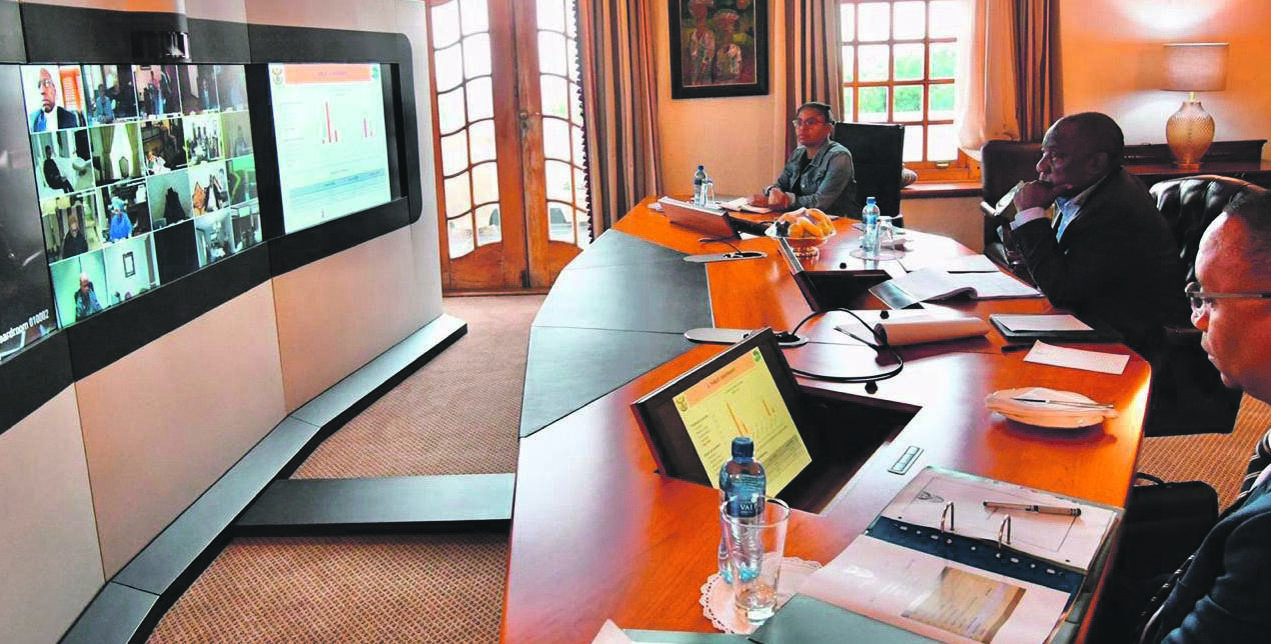
For all the talk about planning for the fourth industrial revolution, the Covid-19 coronavirus has done more to spur government to implement new-age technologies than anything preceding it.
On Thursday, the presidency released pictures of President Cyril Ramaphosa leading a virtual meeting with the national command council, the decision-making body helping him to handle the Covid-19 crisis plaguing the country, on an elongated Huawei screen – from the comfort of his official residence, Mahlamba Ndlopfu.
Earlier in the week, a video was released showing Ramaphosa asking Cabinet members to mute their microphones when not speaking to him.
This, as he was seen being hampered by background noise while trying to listen to an MP speaking.
The video call was conducted on his now-famous tablet.
And last week, the president was part of an emergency G20 virtual meeting, for which world leaders gathered via video call from their respective offices.
They included US President Donald Trump and his Russian counterpart, Vladimir Putin.
The meeting was convened by Saudi Arabia’s monarch, King Salman.
This week cemented the notion that the digital revolution had finally happened; that governments across the world had stopped talking about it and begun using available technology to conduct the business of state.
A pandemic that forces people to stay isolated and keep their distance from other human beings has been the perfect catalyst for governments to go electronic and become e-governments, if you will.
Read: Essential tech to survive the lockdown
In the US, many states have signed the Open Meetings Act.
It allows for local government and public bodies to hold telephonic and video meetings instead of in-person ones.
It also allows the public – that is, those who can access technology – to get involved virtually in one way or another.
In Australia and New Zealand, a process is under way for their respective parliaments to hold an electronic sitting.
Committees are hard at work developing rules and guidelines to facilitate this.
The idea of electronic, remote voting is also becoming common, with many countries and public institutions looking at practical and legal ways to implement this.
But e-governments need not be limited to video and telephone calls.
Banking systems, money transfers, instant messaging and, indeed, a complete digital economy are being envisioned, with some countries already implementing technologies for this advancement.
Take Kenya, where M-Pesa – a mobile phone-based money exchange, transfer and financing system – has become ubiquitous.
The service has gained a steady following over the years and is now used by almost 20 million people and occupies nearly 75% of the mobile money market.
Last month, President Uhuru Kenyatta said one of the ways to fight Covid-19 lay in “exploring ways of deepening mobile money usage to reduce the risk of spreading the virus through the physical handling of cash”.
In a time of crisis, a MacGyver-type attitude becomes common as many people try to find novel ways to resolve problems.
In our robotic age, such innovations are bound to involve the use of technology.
South Africa’s government has now fast-tracked spectrum allocation by opening up legislation to enable mobile tracking and tracing.
It has also enhanced digital connectivity and access via websites, portals, WhatsApp, telephone lines and even SMSes.
We may even see 5G technology arrive here sooner than expected.
However, a caveat to Ramaphosa and his Cabinet must be issued: Beware the digital divide – consider equipping those without proper access and whether in an ‘e-democracy’ we will still be able to differentiate between the right to privacy and the right to safety and security.
Do you think our government should continue meeting virtually even after the Covid-19 crisis?
SMS us on 35697 using the keyword CABINET and tell us what you think. Please include your name and province. SMSes cost R1.50. By participating, you agree to receive occasional marketing material
 |
| ||||||||||||
| |||||||||||||




 Publications
Publications
 Partners
Partners








